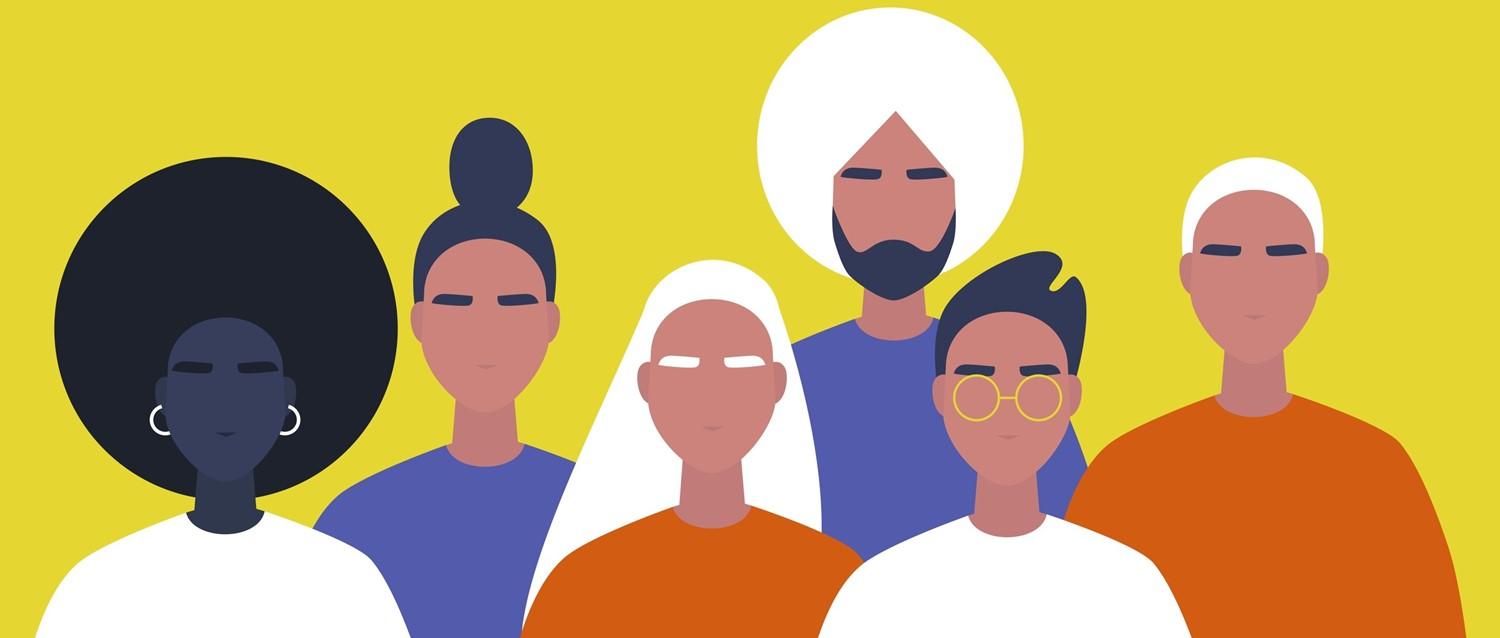
Debunking eating disorder myths and stereotypes
Peer reviewed by Dr Sarah Jarvis MBE, FRCGPAuthored by Emily Jane BashforthOriginally published 28 Feb 2022
Meets Patient’s editorial guidelines
- DownloadDownload
- Share
- Language
- Discussion
Mental health care provider The Priory Group estimates that 1.25-3.4 million people in the UK have an eating disorder. Despite this number, there are still many eating disorder myths and stereotypes surrounding the reality of eating disorders. While these misconceptions remain prevalent, people with eating disorder symptoms are likely to face barriers when reaching out for help. In this piece, we’ll explore some of the most common eating disorder myths, and assess why they are damaging.
In this article:
Continue reading below
Eating disorder myth: Eating disorders only affect young, teenage white girls
Eating disorder fact: Eating disorders do not discriminate and they can affect anyone of any age, ethnicity, gender, or sexual orientation.
Research conducted by eating disorder charity Beat found that 4 in 10 people incorrectly believe eating disorders (EDs) are much more common in white people. In turn, Black, Asian and minority ethnic groups feel less confident than white people in seeking help from a health professional for an eating disorder. 52% said they would feel confident doing so, compared with 64% of white British respondents.
LGBTQ+ people are at a higher risk of developing eating disorders, yet 37% of lesbian, gay or bisexual respondents said they would not feel confident seeking help, compared to 24% of straight people.
As for age, the common misconception that only teenage girls have EDs suggests they are 'children's illnesses' when in reality, they can develop at any stage in life. Research shows that more adults suffer from eating disorders than young people. However, the struggles of those who are older often go unnoticed. 60% of respondents to Beat's survey believe eating disorders predominantly affect young people.
EDs are also not exclusively female illnesses. 25% of sufferers are thought to be male, and that only includes those who are diagnosed and those who speak out. However, stereotypes around both eating disorders and masculinity can deter boys and men from seeking help, fearful of being perceived as 'weak'.
Eating disorder myth: Anorexia and bulimia are the only serious eating disorders
Eating disorder fact: The Diagnostic and Statistical Manual (DSM) recognises seven classifications of eating disorders.
The DSM was originally published in 1952, with the latest edition being the DSM-5. Written by the American Psychiatric Association (APA), the manual classifies mental disorders using a common language and standard criteria.
The seven eating disorders officially recognised in the latest version are:
Binge eating disorder (BED).
Pica - a compulsion to eat substances that aren't food, such as chalk or coal).
Rumination disorder - regurgitating food, chewing it and swallowing it repeatedly).
Other specified feeding and eating disorders (OSFED). These eating disorders don't fulfil the strict criteria needed for any one of the diagnoses above, but can be every bit as serious.
While the three most common eating disorders are anorexia, bulimia and binge eating disorder, they are not the only ones, nor are they innately more serious.
"The National Institute for Health and Care Excellence (NICE) reports that atypical eating disorders are actually the most common. This means those that fall under OSFED. This is followed by binge eating disorders and bulimia nervosa. Anorexia nervosa is the least common," explains eating disorder recovery psychologist Dr Rachel Evans.
Continue reading below
Eating disorder myth: All people with eating disorders are underweight
Eating disorder fact: You cannot tell if someone has an eating disorder just by looking at them.
"Some people experience weight loss as a result of an eating disorder. Others gain weight or remain the same. The observable physical symptoms vary between different eating disorders and between people with the same diagnosis," explains Dr Evans.
"What’s more, weight fluctuations or physical symptoms associated with eating disorders could be caused by other illnesses or circumstances, such as stress. You can't tell if or how much someone is struggling with an eating disorder by appearances alone."
Fewer than 6% of people with eating disorders are medically classed as 'underweight'. While weight is often used as guidance in treatment, and it can determine what kind of support someone needs, it's important to remember that eating disorders are mental illnesses and behavioural disorders - not weight disorders.
Importantly, in many areas of the UK, access to specialist NHS help is limited to those below a certain Body Mass Index (BMI). The 'Dump the Scales' campaign calls for greater recognition of the need to recognise severe symptoms using criteria other than weight.
Eating disorder myth: Recovery is just a matter of learning how to eat again
Eating disorder fact: Recovery is a complex process.
Dr Evans explains how an eating disorder is caused and maintained by multiple physiological and psychological processes. Therefore, the misconception that recovering solely involves learning to eat again is harmful.
"Believing this can mean treatment focuses too heavily on behaviour, rather than on the thoughts and processes that underlie that behaviour. If someone's mindset towards food and their body remains largely unchanged, there is a higher chance of them relapsing."
She adds that this misconception means family and friends may think someone has recovered if their eating patterns become more 'normal'. But, the person may still be struggling with anxiety and guilt around food. Therefore, they still need compassion.
Continue reading below
Eating disorder myth: Eating disorders are a lifestyle choice and they derive from vanity
Eating disorder fact: There is never a single cause for an eating disorder and they are not something people choose.
People do not 'choose' to have an eating disorder. Promoting this idea perpetuates misinformation and tells sufferers that their illness is their fault. In reality, no one is to blame, and suggesting as much does not aid the healing process.
Dr Evans says an eating disorder is a coping mechanism and response to life events - often trauma - that interplay with personality traits and individual biology.
"For some people, body image plays into the development of an eating disorder if they change how they eat and/or exercise in order to try to control their weight or shape."
It's estimated that 25% of people who start a diet go on to develop an eating disorder, which Dr Evans says can be a neurobiological response to malnutrition and starvation.
With regard to binge eating disorder, Dr Evans says it is often not a conscious choice on the first occasion and it is maintained by the 'rewards' of the behaviour. These might include a chance to disconnect from life stresses or to nourish the body after a period of extreme restriction. People can then feel compelled to keep doing it.
Why are these eating disorder myths harmful?
Perpetuating myths about eating disorders can mean that non-sufferers have a warped perception of what they truly are. This may prevent those suffering from admitting they are struggling. Dismantling myths is essential to ensuring everyone feels able to reach out for help.
Delays in seeking treatment
Leaving myths about eating disorders unchecked can prevent those with symptoms from realising they need help in the first place. If someone doesn't fit the stereotype of what they think an eating disorder 'looks like', they might not be aware that their relationship with food is damaging. As a result, there could be delays to their treatment. Early intervention is key to ensuring someone can recover fully as soon as possible. The longer they wait to access treatment, the more damage there is likely to be to their physical and psychological well-being.
Increased shame
Some demographics - such as heterosexual, cisgender men - can experience great shame around eating disorder behaviours. Dr Evans says increased stigma can be attached to a diagnosis because these people don't fit the stereotype.
"If people continue to believe misconceptions and do not seek treatment, the statistics that relate to how frequent eating disorders are among these groups will be skewed. This in turn will perpetuate the belief that people from certain groups aren't affected - which can further deter people in these groups from seeking help ," she says.
Furthermore, placing a heavy focus on weight underplays how complex these illnesses are. Eating disorders are psychological illnesses, and feelings such as anxiety, fear and loneliness are often experienced, regardless of someone's weight.
Downplaying the complexity of recovery
"Viewing an eating disorder as a choice implies that someone can simply choose to recover and, voil, they are better. But it isn't that simple. While I believe that making a conscious choice to pursue recovery is important, recovery is a series of choices. Someone must make choices multiple times per day when they encounter triggers," explains Dr Evans.
What needs to be done to dismantle these eating disorder myths?
Dr Evans highlights the urgency of raising awareness of what eating disorders actually are. This offers insight to loved ones on the complex causes of EDs and it can help those struggling make sense of what is happening to them.
We can do this by having open conversations and listening to the lived experiences of a wide range of people.
Is extra support and awareness for eating disorders needed in healthcare?
Additionally, Dr Evans stresses that doctors must be able to recognise the signs of eating disorders, which comes from offering them the best possible training.
It is understood that GPs have extensive training across multiple areas of health. However, due to the breadth of clinical areas they must cover, additional learning could provide deeper insight into specific illnesses.
Supporting healthcare staff in their training means they can spot the signs before it's too late and refer patients to appropriate services.
Dismantling stereotypes in medical settings is also crucial to patients feeling comfortable disclosing the full extent of their EDs.
"Patients may intentionally withhold important information from a doctor or therapist if they believe they will be judged for having an eating disorder, due to misconceptions that only women get eating disorders or that these derive from vanity," says Dr Evans.
GP Natasha Usher recalls her own training, saying that trainee GPs "definitely don't get enough".
"As I was taught as a student, there was a lecture on eating disorders as part of psychiatry in the fourth year. As a GP trainee, I did six months in psychiatry and there were a couple of inpatients with bulimia that I helped manage. As I've cared for patients, I've become more aware of how to talk to teenagers especially. I am getting better at this, but there is a big gap.
"We need to be aware of issues like diabulimia and orthorexia, which are relatively new concepts. Anorexia is lifelong, but we are seldom taught about caring for adults who relapse."
She believes GPs would benefit from involvement from those with lived experiences in their training, as they are more aware of the early signs and can share what to say and what not to say.
More inclusive research for eating disorders
Dr Evans adds that research into eating disorders needs to become more varied to establish a full picture of who is affected.
"We need to proactively include a more diverse sample of participants. Most research is conducted with females and those who fit into the DSM-5 classifications of anorexia, bulimia or binge eating."
Patient picks for Eating disorders

Mental health
Meal plan tips for eating disorder recovery
Getting back to eating in a way that would be described as 'normal' is not easy when recovering from an eating disorder. Many people in recovery find that both preparing food and eating make them feel incredibly anxious, despite a desire to get better. So what can you do to ensure that you are nourishing your body while keeping your fears at bay?
by Rose Constantine Smith, ANutr

Mental health
Connections between 'clean eating' and orthorexia
On the surface, clean eating appears to be a positive health choice. However, it is one which harbours the potential to cause major long-term health concerns.
by Rose Constantine Smith, ANutr
Article history
The information on this page is peer reviewed by qualified clinicians.
28 Feb 2022 | Originally published
Authored by:
Emily Jane BashforthPeer reviewed by
Dr Sarah Jarvis MBE, FRCGP

Ask, share, connect.
Browse discussions, ask questions, and share experiences across hundreds of health topics.

Feeling unwell?
Assess your symptoms online for free
Sign up to the Patient newsletter
Your weekly dose of clear, trustworthy health advice - written to help you feel informed, confident and in control.
By subscribing you accept our Privacy Policy. You can unsubscribe at any time. We never sell your data.